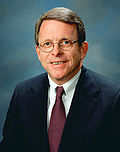
The 104th United States Congress began on January 3, 1995. There were nine new senators (all Republicans) and 86 new representatives (13 Democrats, 73 Republicans), as well as one new delegate (an independent), at the start of the first session. Additionally, three senators (one Democrat, two Republicans) and seven representatives (four Democrats, three Republicans) took office on various dates in order to fill vacancies during the 104th Congress before it ended on January 3, 1997.











